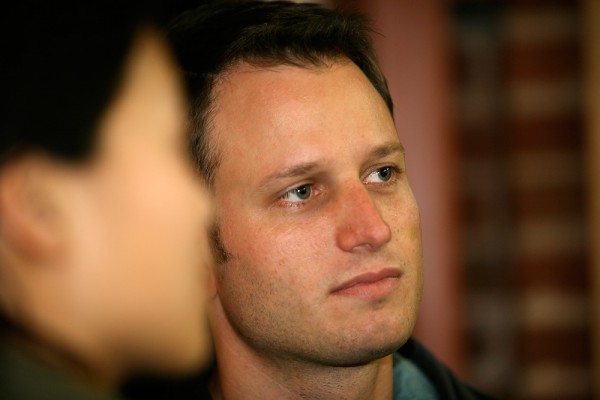

Corey Ford, a former Frontline documentarian who left public media to reinvent it in Silicon Valley, has been named director of the Public Media Accelerator, a $2.5 million incubator launched by PRX and funded by the Knight Foundation.
Ford, 34, produced 17 films in six years at Frontline, sharing in duPont and Emmy awards, before quitting to earn his MBA at Stanford and eventually become a venture capitalist.

“I had a tremendous career in public television, but for me, I thought…Media is changing so dramatically. Business models are changing so dramatically. This is not a growth industry. We’re not changing at all,” Ford told me.
“That’s when I started thinking, I want to get out to Silicon Valley, and I want to learn more about how entrepreneurship and innovation work.”
That kind of thinking is very much in line with the PRX ethos: We love public media, but we wish it could be so much more.
“It’s almost like he was dreamt up in our laboratory,” said Jake Shapiro, the executive director. “He shares a lot of DNA with PRX.”
The idea for Public Media Accelerator is built on Y Combinator and TechStars. Entrepreneurs and engineers compete for seed money and the chance to work heads-down on a new project for 12-week stints. The resulting work is presented to high-rolling investors for the opportunity to build a business. Applications open this summer.
“You may or may not save the current institutions, but you can have the mission of journalism at the core of what you do.”
While at Stanford, Ford discovered the Institute of Design, the d.School, and became a disciple of design thinking, the multidisciplinary, blank-slate approach to problem-solving.
After finishing the program he became a teacher, leading an experiment to “redesign journalism” in 2009 that helped inform Stanford’s revamped, project-focused Knight fellowships. Ford’s students included Burt Herman, co-founder of Storify and founder of Hacks/Hackers, and Andrew Haeg, co-founder of APM’s Public Insight Network.
Ford was then recruited to join a new venture-capital firm for Google’s Eric Schmidt, Innovation Endeavors, where he created a paid nine-month entrepreneurship program not unlike the Public Media Accelerator’s. After a year building that program from scratch, Ford is taking on the new role at PRX beginning April 1, bringing his career full circle.
Ford stresses the parameters are still being worked out. “Like any good design thinker,” he said, “I need to start with empathy and need-finding and low-res prototyping before jumping to ‘This is the solution.'”
Ford will stay put in Palo Alto, which is not what PRX originally had in mind. Shapiro had hoped to give the accelerator a strong Boston/Cambridge identity. “My fantasy is everyone’s working elbow to elbow,” Shapiro told me, but in reality PRX’s own staff is spread across the country. Ford said he will have to figure out whether the accelerator is “a place or a distributed thing,” how much value physical space has in the digital world.
Public media has a problem attracting hungry 20-something tech stars.
This is all very new for public media, for journalism in general. The industry has a little bit of an image problem when it comes to attracting tech talent. Just this week, Sarah Cohen at Duke’s new Reporters’ Lab said it best: “Bright engineers tend not to be interested in solving today’s problems but future problems.”
For a lot of hungry 20-something tech stars, journalism might seem like today’s problem.
“Entrepreneurs come from all different walks of life — technologists, designers, business people, media people, storytellers who are passionate about this mission,” Ford said. “Yes, the biggest talent war is going in Silicon Valley right now, as we speak, but I’ve learned from personal experience that if you set up something that really celebrates the entrepreneur, and gives them a chance to pursue their passion and treats them…like entrepreneurs, you can attract amazing talent.”
Ford continued: “It’s not about looking toward the past. It’s more about reimagining the future…You may or may not save the current institutions, but you can have the mission of public media and journalism at the core of what you do.”
Disclosure: The Knight Foundation is also a financial supporter of the Nieman Journalism Lab. The photo of Corey Ford is provided as a courtesy of the Stanford Institute of Design.